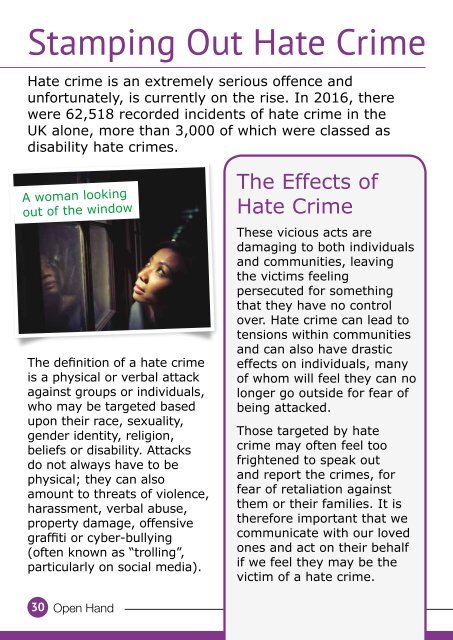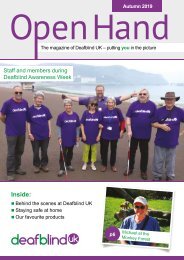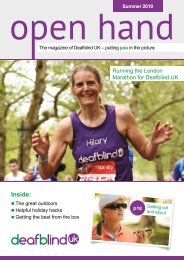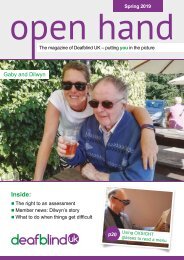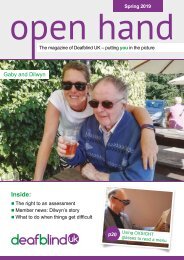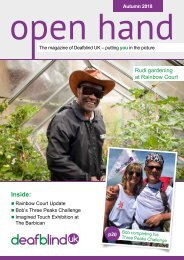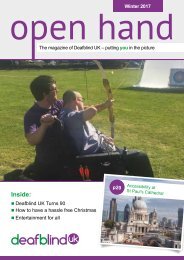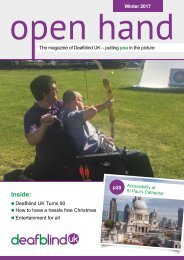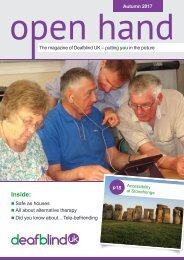DB Openhand Magazine_June2017
Create successful ePaper yourself
Turn your PDF publications into a flip-book with our unique Google optimized e-Paper software.
Stamping Out Hate Crime<br />
Hate crime is an extremely serious offence and<br />
unfortunately, is currently on the rise. In 2016, there<br />
were 62,518 recorded incidents of hate crime in the<br />
UK alone, more than 3,000 of which were classed as<br />
disability hate crimes.<br />
A woman looking<br />
out of the window<br />
The definition of a hate crime<br />
is a physical or verbal attack<br />
against groups or individuals,<br />
who may be targeted based<br />
upon their race, sexuality,<br />
gender identity, religion,<br />
beliefs or disability. Attacks<br />
do not always have to be<br />
physical; they can also<br />
amount to threats of violence,<br />
harassment, verbal abuse,<br />
property damage, offensive<br />
graffiti or cyber-bullying<br />
(often known as “trolling”,<br />
particularly on social media).<br />
The Effects of<br />
Hate Crime<br />
These vicious acts are<br />
damaging to both individuals<br />
and communities, leaving<br />
the victims feeling<br />
persecuted for something<br />
that they have no control<br />
over. Hate crime can lead to<br />
tensions within communities<br />
and can also have drastic<br />
effects on individuals, many<br />
of whom will feel they can no<br />
longer go outside for fear of<br />
being attacked.<br />
Those targeted by hate<br />
crime may often feel too<br />
frightened to speak out<br />
and report the crimes, for<br />
fear of retaliation against<br />
them or their families. It is<br />
therefore important that we<br />
communicate with our loved<br />
ones and act on their behalf<br />
if we feel they may be the<br />
victim of a hate crime.<br />
Someone working<br />
at a laptop<br />
Reporting an Attack<br />
If you or somebody you<br />
know has been a victim<br />
of hate crime, you should<br />
report it immediately as it<br />
may become a police issue.<br />
It is still important to make<br />
the police aware even if no<br />
laws have been broken – if<br />
they have knowledge of the<br />
perpetrators then they can<br />
monitor the situation.<br />
If you have been personally<br />
attacked, remember that it is<br />
not your fault and you have<br />
not done anything wrong. In<br />
an emergency, call the police<br />
on 999, or if you cannot make<br />
voice calls, ensure you are<br />
registered with Emergency SMS<br />
www.emergencysms.org.uk.<br />
In non-emergencies, you can<br />
speak to the police on 101, or<br />
contact your local station.<br />
Hate crimes can be<br />
reported anonymously and<br />
investigated by police at<br />
www.report-it.org.uk, or if<br />
you do not want to fill in forms<br />
you can call Crimestoppers<br />
on 0800 555 111 or visit<br />
www.crimestoppers-uk.org.<br />
Alternatively, there are<br />
numerous charities who can<br />
help including Stop Hate UK<br />
(call 0800 138 1625 for a<br />
24-hour helpline) and Victim<br />
Support UK (08081 689 111).<br />
You can also contact your local<br />
Citizens Advice Bureau<br />
by visiting www.<br />
cItizensadvice.org.uk.<br />
Remember – by reporting the<br />
incidents, we can all work<br />
together to put a stop to hate<br />
crimes against disabled people<br />
once and for all.<br />
This information has been kindly<br />
supplied by Emma Elmett, Hate<br />
Crime Officer at Cross Keys<br />
Homes in Peterborough.<br />
For more information<br />
or for help reporting<br />
a hate crime, contact<br />
the Deafblind UK<br />
Information and<br />
Advice Line.<br />
30 Open Hand<br />
Open Hand 31


